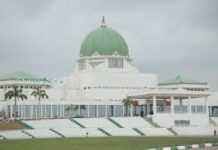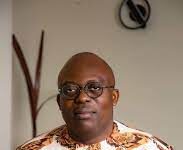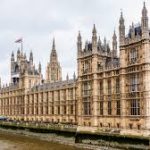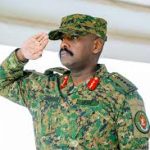COLUMN
By ’Tunji Ajibade
Furthermore, not to be forgotten is party loyalty that members of a political party and the electorates in general tend to have no matter the religion of their party flagbearers. Christians who belong to a party or have sympathy for a party will still vote for it even if the faith of the flagbearer is different from theirs. It’s the pattern we’ve seen and it’s one that no one can deny. Muslims also do the same and this tendency is often demonstrated, especially, in the south-west of Nigeria where members of both faiths are found in the same family. No matter your faith, once you belong to the family, the members are likely to vote for you and your party because they attach more importance to kinship as a bond than they regard their different faiths as a divider. As such even if, for instance, APC presidential and vice-presidential candidates happen to be Muslims, voters will elect them.
In addition to this, the fact that people in communities and neighbourhoods have their reasons for perennially voting for the political party they do is another reality that mustn’t be overlooked. People would vote the same political party even if the faith of the flagbearer is different from theirs. Such reasons may be historical, and there’s the emotional attachment to political parties as well that is more powerful than the issue of the religion of the party’s flagbearer. I have been on campaign trails during which I see the people with me point to neighbourhoods or streets and say residents are die-hard loyalists of one political party or the other. Particularly in the south-west of Nigeria and the north, this situation will play out if, for instance, the APC happens to have a Muslim-Muslim ticket in the 2023 presidential election.
Still on the APC, it must not be forgotten that the party almost had a Muslim-Muslim ticket in 2014, consisting of Major General Muhammadu Buhari (retd.) and Ashiwaju Bola Ahmed Tinubu. The latter was persuaded to allow a Christian to be Buhari’s running mate only for one major reason, and that was the fact that PDP was in power and its candidate was a Christian, President Goodluck Jonathan. The political climate around that time was likely to assist PDP to use a Muslim-Muslim ticket as a campaign point against APC that had never been in power before. For the simple reason that the PDP was in power, such issue might have worked in its favour and against the APC. No one was sure that was exactly what would have happened, but I imagine the APC leadership chose to err on the side of caution so Tinubu jettisoned his ambition in the overall interest of the party. The condition for the 2023 presidential election is different though. It is because APC is in power and the PDP is in opposition and therefore in a weaker state. That counts for something if APC has a Muslim-Muslim ticket, and more so in a situation where APC has other levelers to use to persuade the electorates to be on its side in the 2023 presidential election.
What are these levelers. One is its existing government programmes –N-power, Tradermoney, etc – which it can use as leverage to claim that even if it has a Muslim-Muslim ticket, the incoming government will improve on such programmes and ensure voters continue to enjoy them. Such persuasive points are always used by politicians, and APC’s would even be more impactful as some of its programmes are the first of their type from people’s standpoint. And now that it is APC that is in power, it is also in a better position to use its incumbency to douse the effects of any campaign by the opposition meant to cause disaffection regarding its Muslim-Muslim ticket. That is one other reality we need to bear in mind before any group threatens that a party will suffer it has a Muslim-Muslim ticket.
The faithfulness south-westerners will show the party that has Muslim-Muslim ticket but the presidential candidate is Yoruba has already been stated. This is done in reference to APC in particular. Now, one can also refer to the faithfulness the North will keep with APC. This has been partly discussed earlier too, but the other angle or the impetus to it is the influence of President Buhari. He’s the outgoing president who still enjoys so much goodwill among northerners. No doubt, his endorsement of the flagbearers of his party will still count for much in the 2023 presidential election in particular. In the event, if APC presents a Muslim-Muslim ticket, the president’s supporters in the north will vote for the party, adding significantly to south-west’s votes that a possible APC Yoruba presidential candidate, as earlier explained, will secure.
But there is this other vital angle that is often overlooked among those who campaign against a ticket that has the president and his VP as members of the same religion. This angle is the fact that they do not attribute any level of sophistication to the north, its people and its political leaders. But such is a mistake. I’ve submitted before that the north is politically more sophisticated than some give it credit for. How is the north showing this political sophistication at the moment? One, with Buhari’s two terms secured, northern political leadership has actually been able to persuade their people that it is time the south is given its chance. Northerners, educated or not so educated understand and have come to accept this.
Does anyone argue that northerners don’t have a sense of fairness when it comes to power shift? They are mistaken and in the past few years I have told many who made contrary argument the same thing in private conversations. Two, within APC especially, it would be noted that many northerners who are equally worthy presidential hopefuls have conspicuously stayed out of the race. The northerners within APC who join the race do so for other calculations, and this shall be made obvious to all from now on until the 2023 general elections are concluded. But among the foremost examples of northerners who show political sophistication and who have conspicuously stayed away from the race is the Governor of Kaduna State, Malam Nasir El-Rufai.
The only reason one would imagine El-Rufai does not join the race is that he is among the prominent northerners who recognize that the south should present the next president. It must be remembered that he was at the centre of the merger talks that led to the emergence of APC from other political parties in 2013. He is in the best position to know that it is time for north to keep faith with the south-west in particular whose support helped APC to arrive power back in 2015. And that is what people like him are doing, keeping faith with the party, keeping faith with south-west from where a Muslim presidential candidate might ultimately emerge for the 2023 contest. Against this backdrop, northern APC political elite will do their utmost to persuade their followers, Muslims and Christians, to vote for the candidates of the party whether or not it’s a Muslim-Muslim ticket. That’s another reality that mustn’t be overlooked.
One other reality is that Nigerians in general are by now tired of the use of faith as the basis for seeking their votes. This is especially the case among those who soberly assess the country’s situation, people who watch as politicians loot and engage in maladministration irrespective of the religion they belong to. Nigerians see the looting going on. They see that no faith is exempted. They see the quality of governance at different levels. No faith is left out. The people that some sold to voters as people of honour, people who would not loot the treasury because of their faith have turned out to be a disappointment. As such, careful observers know that this thigng is not always about the religion. Good, competent and honourable administrators can come from any faith, and sometimes they don’t even belong to any faith. In the event, any effort to call attention to the faith of presidential and vice-presidential candidates of political parties, particularly APC, may not have any significant impact on the party’s fortune in the 2023 election.
As already stated, it is somewhat tiring, and a disservice to the people of this nation that we still have groups that come out to issue threats over the ticket that any party has. Emotional pronouncements that religion provokes are one thing, the reality that Nigerians face is another. The reality is that, with what Nigerians have seen, no faith can lay claim to having a monopoly of producing incorruptible and competent hands.
No single religion can claim to have all the righteous people, if by the elementary definition of righteousness we mean doing what is right, and doing what Supreme Being commands should be done for people by leaders. One thinks it’s more helpful that we’re mindful of our realities as already stated, rather than engage in issuing threats based on religious differences that may cause tension and needless division among Nigerians.
Concluded
tunjioa@yahoo.com










